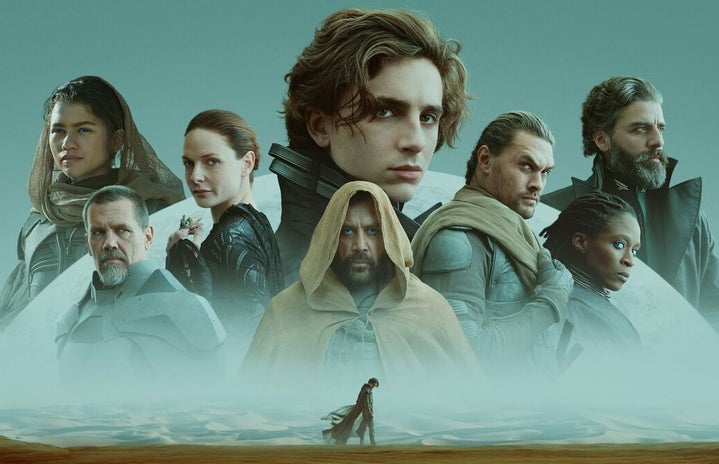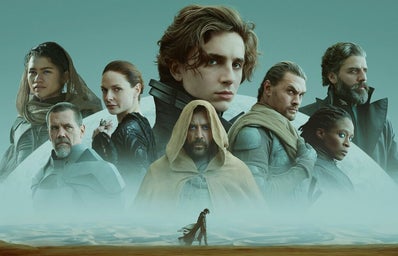Dune, directed by Denis Villeneuve, is a new viral movie that’s captured everyone’s attention because of the star-studded cast. I watched it and have some thoughts.
The movie was released on October 22 on HBO MAX and in theaters. The cast includes Zendaya, Timothée Chalamet, and Jason Momoa among many other recognizable faces. Dune ranked 83% on Rotten Tomatoes and 8.2/10 on IMDB. So it must be worth the watch, right? Well, I watched the movie and even the appeal of big name actors can’t give me the two and a half hours I wasted watching it back.
SPOILER WARNING
My opinion might be controversial given the film’s high ratings but, for starters, the plotline was in absolute disarray. In fact, it took all of my brain cells to even figure it out.
The movie is set in the year 10191. It briefly explains that the leader of the known universe was an emperor named Shaddam IV. He was in charge of all the known universes, which were kind of like districts or houses.
Arakis is a planet known to have a valuable commodity referred to as “spice.” To them, spice has a hallucinogenic healing property and, to the rest of the world, is a tool to travel through space and time. The entirety of the planet, on the other hand, is a desert because of treacherous climate events. It has dangerous gigantic sandworms and its citizens have bright blue eyes from being exposed to the spice. Citizens could not survive out in the heat without a high-tech bodysuit that regulates hydration and temperature.
The Arakis were being mined and violently controlled by the Harkonnens until Shaddam IV pulled back and put the house of Atreides in charge to “facilitate peace.” Paul (Timothée Chalamet) is the son of the duke and has visions of the future. He even dreams of a girl named Chani, played by Zendaya. These dreams basically mimic teenage boy visions of pretty girls giggling and running away but seem to be characterized as incredibly vague prophecies of what’s to come.
His mother, Lady Jessica (Rebbecca Ferguson) was of Bene Gesserit descent. It is revealed that the Bene Gesserit, who could creepily control their voices for mind-control, were pulling political strings behind the scenes. It’s also noted that Paul was trained by his mother when it was prohibited to do so.
When Paul and his family travel to Arrakis, he realizes everyone thinks he’s “The One” — he is supposed to save them. However, not long after, the Atreides realized they were sent there to die. The rest of the movie plays out with Paul and his mother fighting to survive in the desert and the Harkonens fleeing after them. In the end, they find themselves with the Arakis, also known as the “fremen.”
I don’t think Dune was bad, per se, but for all of the build up to give no closure, no ending, and just drift to a boring abyss of nothing, it’s definitely disappointing. The film declares there’ll be an eventual sequel and I’m curious to see if it’s just as lack-luster.
One of the biggest mistakes Dune makes is the amount of time and effort it took to build the universe and give you an understanding of how the world they created worked. Disappointingly, even considering all that time spent, it felt forced and even hard to comprehend. I believe It would have been so much better suited as a series, where they could take their time and focus on attention to detail so that viewers could better understand the story, overall.
Another major problem I had with the movie was its lack of representation. I was quite confused that, in such a vast universe of world traveling districts, somehow nearly every character was white. Zendaya, who played no role and just slapped her name and face on the movie, was one of the only poc characters.
I also think it’s possible the film was trying to replicate what the United States did to the Middle East. The U.S infiltrated the Middle East for oil, just like the Harkoninns did to the Arrakis for spice. They exemplify a massive, powerful entity coming into an impoverished nation with the intent of forcibly stealing valuable resources — similar to any example of colonialism in the past. It has hints to history, but it’s not clear or evident enough whether that message is accessible to everyone. As a movie adaptation of the book, it’s also possible that the film was just released at a relatable moment in society, a concept that seems it’ll pose as a theme until the end of time.
The movie’s biggest downside was its time restraint and lack of transition, explanation, and connection between scenes. For example, the antagonist of the movie was stabbed with poison that killed the entire room but he lived because he was somehow floating near the ceiling. It’s almost cringy. Just basic characteristics of the movie were thrown in at random times.
The sad part is that this storyline had potential. The movie is based on a book and I’d be far more interested in reading it to see if the story is delivered in a more clear and cohesive way.
Dune grossed $69.4 million in North America and $292.1 million globally. Its budget was $165 million usd. To spend that much and only make 42% of your investment back seems like a flop, to me. It has, however, made a sufficient amount in other countries so…so is the problem more so that Americans just don’t like Dune? I mean, I don’t blame them.
Overall, I didn’t enjoy this movie. It left me confused, frustrated, and disappointed. The storyline is too complex for a movie and if it was a series, I think it actually could’ve been a great success.


